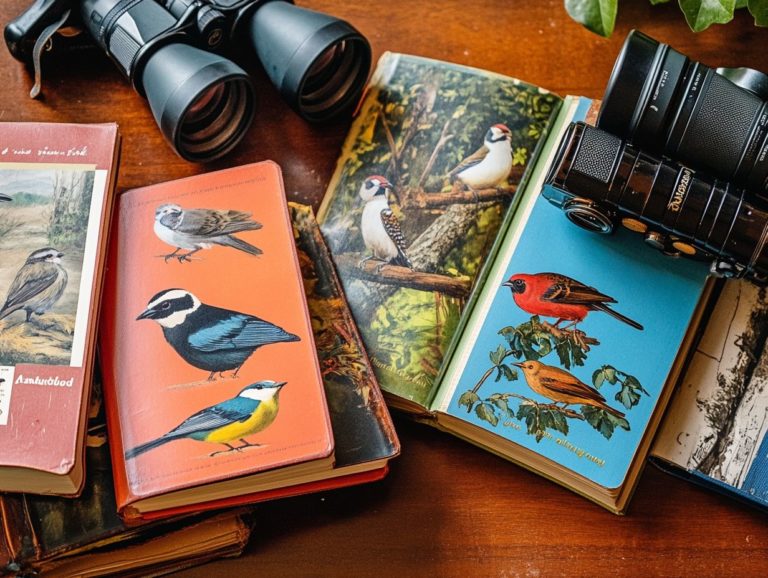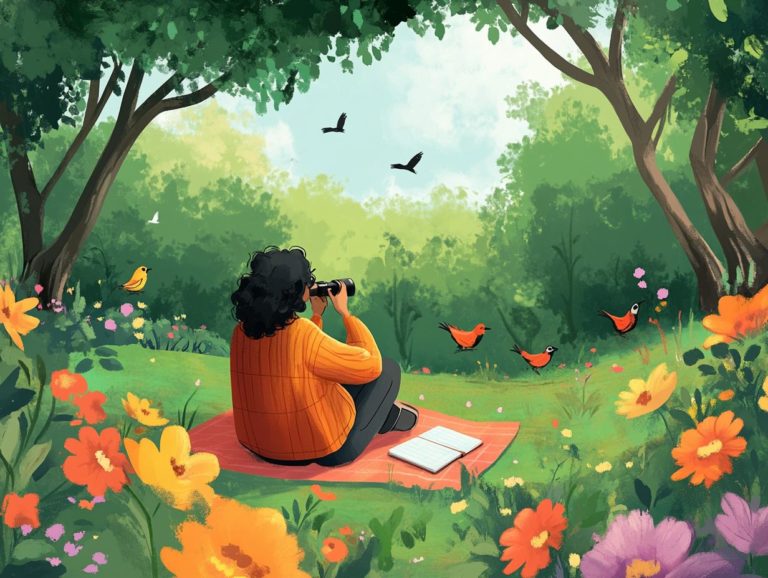What Are the Benefits of Bird Watching?
Bird watching is not merely a leisurely pastime; it serves as a gateway to a deeper connection with nature, offering a wealth of physical and mental benefits.
Whether you re an experienced observer or simply intrigued by the avian world, this guide will introduce you to the essentials of bird watching from the equipment you ll need to the positive impact it can have on your well-being.
Discover how to embark on your birding journey, identify the best locations, and practice respectful observation.
Embrace the joys and benefits of engaging with our feathered friends.
Contents
- Key Takeaways:
- The Basics of Bird Watching
- Physical and Mental Benefits of Bird Watching
- Connection to Nature
- Improved Mental Health
- How to Get Started with Birdwatching
- Finding Birding Locations
- Joining Birding Groups
- Tips for a Successful Bird Watching Experience
- Frequently Asked Questions
- What are the benefits of bird watching, including nature benefits and the emotional benefits of outdoor activities?
- How does bird watching improve physical health?
- What are the mental benefits of bird watching?
- Can bird watching improve social connections?
- Are there any environmental benefits to bird watching?
- How can birdwatching benefit children?
- Physical Benefits
- Mental Benefits
- Social Connections
- Environmental Awareness
Key Takeaways:

- Experience peace and relaxation in our busy world through bird watching.
- Research shows that bird watching can improve your thinking skills and emotional well-being.
- Finding birding locations and joining birding groups can enhance your overall experience.
The Basics of Bird Watching
Bird watching, or birding as it’s often called, is an engaging outdoor activity that invites you to observe, identify, and appreciate a diverse array of bird species in their natural habitats.
This enriching practice deepens your connection to nature while fostering environmental awareness and community involvement.
You ll find that bird watchers often frequent urban green spaces, parks, and wildlife reserves, making this hobby accessible even in bustling cities like Los Angeles, Spain, or Shetland.
As you delve into the captivating world of bird species, you cultivate a heightened understanding of biodiversity and the vital importance of preserving natural environments.
What is Bird Watching?
Bird watching invites you to observe and identify birds in their natural habitats, whether you’re wandering through urban parks or exploring rural landscapes.
This activity offers not just a tranquil retreat into nature but also deepens your connection to the world around you.
As an enthusiast, you might employ various methods to enhance your experience; for instance, using field guides allows you to familiarize yourself with different species through visual and auditory cues.
Many now embrace technology by utilizing apps that provide real-time identification and tracking capabilities, making it easier to engage with the avian community.
This blend of traditional and modern approaches enriches your experience, fostering a profound appreciation for biodiversity and the intricate web of life flourishing in our ecosystems.
Essential Equipment
To truly embrace the art of bird watching, you’ll want to equip yourself with a few essential tools: high-quality binoculars and a comprehensive field guide.
Investing in quality binoculars is vital, as they enhance your observation experience by providing clearer images and improved depth perception.
This clarity allows you to fully appreciate the beauty of birds in their natural habitats.
A well-illustrated field guide is equally important, serving not only as a resource for identifying species but also as a means to deepen your understanding of bird behaviors and their environments.
Consider bringing along a notebook to record your sightings and a camera to capture those unforgettable moments.
With this thoughtfully selected gear, you can significantly boost your bird watching experience, honing your observation and identification skills over time.
This thoughtful gear can transform your bird watching adventure into something unforgettable!
Physical and Mental Benefits of Bird Watching
Engaging in bird watching presents a wealth of physical and mental health benefits, including those detailed in the benefits of joining bird watching groups, that can transform your well-being.
Not only does it help reduce stress, but it also enhances psychological health and deepens your connection to the natural world.
Scientific studies reveal that immersing yourself in the outdoors while observing various bird species can significantly boost your thinking skills and emotional well-being.
Esteemed professionals like Gregory Bratman and Nooshin Razani highlight the therapeutic effects nature has on mental health.
Bird watching isn’t just a solitary pastime; it also fosters community connections and promotes overall health outcomes.
Grab your binoculars and step outside your adventure awaits!
Connection to Nature

Birdwatching fosters a deep connection to nature. It helps you appreciate the biodiversity and environment around you.
This immersive activity enhances your understanding of various bird species and fosters a sense of belonging within a wider community. Gather with fellow enthusiasts in local parks or participate in organized groups to share stories and knowledge, forging bonds that transcend age and background.
Through collective efforts, you engage in conservation initiatives protecting vital habitats, demonstrating a commitment to preserving the delicate balance of nature.
The emotional rewards are substantial whether it s the thrill of spotting a rare bird or witnessing a breathtaking migration. These experiences enrich your well-being and inspire a lifelong dedication to environmental stewardship.
Improved Mental Health
Research suggests that birdwatching can significantly enhance your mental health by boosting psychological well-being and alleviating stress. However, it’s important to be aware of the challenges of bird watching. This delightful outdoor activity invites you to immerse yourself in nature, cultivating a profound sense of mindfulness.
Engaging with wildlife through observation lowers the stress hormone levels. When you participate in birdwatching, you sharpen your focus and attention to detail, providing a stimulating workout for your brain.
These elements create a serene environment and a rich platform for forging social connections. Many individuals find immense joy in sharing their discoveries with fellow enthusiasts, further enriching their journey toward improved mental health.
How to Get Started with Birdwatching
Embarking on the journey of birdwatching is accessible and incredibly rewarding. All you need is a genuine interest and some fundamental knowledge about local birding spots and techniques.
You can venture into nearby urban green spaces or national parks, where a diverse array of bird species awaits your discovery. Engaging with community groups enriches your experience.
Resources like the Cornell Lab of Ornithology and local birding clubs offer invaluable insights to guide you. As you delve into the intricacies of various habitats and migration patterns, you’ll develop a profound appreciation for the wonders of bird life.
Finding Birding Locations
Finding the right birding locations is essential for a rewarding birdwatching experience, with urban green spaces and parks serving as treasure troves of diverse bird species.
These areas provide refuge for common residents and welcome migratory visitors year-round. Take Los Angeles, for instance; its plethora of parks and greenways, like Griffith Park and Echo Park, offer easy access to a variety of habitats.
At Griffith Park, you could be thrilled to spot hummingbirds flitting about with their vibrant energy, while the gentle melodies of sparrows serenade you at Echo Park. Exploring these urban sanctuaries enriches your experience and deepens your appreciation for local wildlife and biodiversity.
Joining Birding Groups
Joining birding groups is an excellent way to elevate your birdwatching experience through shared knowledge and community engagement.
By immersing yourself in these local communities, you can connect with fellow bird lovers who share your passion, fostering friendships that extend beyond the trails. Group outings frequently include guided tours led by seasoned birders, giving you the chance to discover new species and techniques while learning about bird habitats and conservation efforts.
These gatherings include workshops and educational sessions that deepen your understanding of avian behaviors, migration patterns, and local ecosystems. Engaging in such communal activities enhances your observational skills and cultivates a sense of belonging within a vibrant, shared interest.
Tips for a Successful Bird Watching Experience

For an exceptional bird-watching experience, be mindful of the optimal times to observe these magnificent creatures, practice respect for their well-being, and adhere to basic etiquette in their natural habitats.
Observing birds during their peak activity periods typically early morning or late afternoon will enhance your chances of rewarding encounters. Following birding etiquette helps create a harmonious relationship between you and the wildlife, ensuring that the birds remain undisturbed.
Best Times to Bird Watch
The best times for bird watching are the magical hours of dawn and dusk, when bird activity is at its highest.
During these enchanting moments, the world transitions awakening or gently settling creating perfect conditions for spotting a variety of species. Early mornings beckon with the thrilling melodies of songbirds like robins and wrens, delightfully engaged in their morning chorus.
As the sun dips below the horizon, the sky becomes a stage for magnificent raptors, such as hawks and owls, gracefully emerging from their daytime retreats. The softer light enhances your visibility, making it easier to discern the vibrant colors and intricate patterns of feathers.
You may even catch a glimpse of migratory birds as they navigate their routes, adding a rich layer to your birdwatching adventure.
Etiquette and Respect for Birds
Practicing proper bird-watching etiquette is vital for ensuring both the safety of the birds and the overall enjoyment of your experience.
This means you should observe from a respectful distance, utilizing binoculars or telescopes instead of getting too close. Encroaching on their space can cause unnecessary stress and disrupt their natural behaviors.
It’s equally important to respect nesting sites and designated wildlife areas, refraining from any actions that could disturb breeding birds. By minimizing noise and staying on marked paths, you not only preserve natural habitats but also allow fellow enthusiasts to enjoy the experience without unwelcome distractions.
Embracing these guidelines helps foster a community that treasures wildlife and contributes significantly to conservation efforts, ensuring that future generations can also indulge in this enriching pursuit.
Frequently Asked Questions
What are the benefits of bird watching, including nature benefits and the emotional benefits of outdoor activities?
Bird watching has numerous physical, mental, and social benefits. It can improve your overall well-being and provide a sense of connection with nature, as outlined in the health benefits of bird watching.
How does bird watching improve physical health?
Bird watching often involves walking, hiking, or even climbing to find different species of birds. This physical activity can help improve cardiovascular health, strengthen muscles, and increase stamina.
What are the mental benefits of bird watching?
Bird watching can help reduce stress and anxiety by providing a sense of calm and relaxation. It also requires focus and concentration, which can improve memory and cognitive skills.
Bird watching can be a great activity to do with friends or join a local bird watching group. It can help build new friendships, foster a sense of community, and provide opportunities for learning and sharing knowledge.
Are there any environmental benefits to bird watching?
Yes, bird watching can increase awareness and appreciation for the environment and the importance of protecting it. It can also encourage individuals to participate in conservation efforts and support local bird habitats.
Join us in this adventure and explore your local birdwatching spots!
How can birdwatching benefit children?
Introducing children to birdwatching can help them develop a love for nature and respect for wildlife. It can also improve their observation and critical thinking skills as they learn to identify different bird species.
Physical Benefits
Birdwatching often involves walking, hiking, or even climbing to find different species of birds. This physical activity can help improve heart health, strengthen muscles, and increase stamina.
Mental Benefits
Birdwatching can help reduce stress and anxiety by providing a sense of calm and relaxation. It also requires focus and concentration, which can improve memory and the ability to think, learn, and remember.
Social Connections
Birdwatching can be a great activity to do with friends or join a local birdwatching group. It can also help build new friendships and foster a sense of community.
Environmental Awareness
Birdwatching increases awareness and appreciation for the environment and the importance of protecting it. It can encourage individuals to participate in conservation efforts and support local bird habitats.
What could be better than bonding with nature? Start birdwatching today and explore the wonders of nature!






